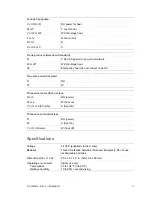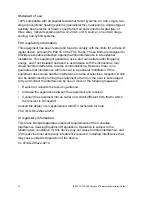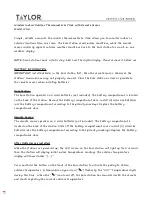
Tools
You will need a small Phillips screwdriver and a drill with a 3/16-in. (4.8 mm) bit
for wall mounts.
Location
For replacement installations, mount the thermostat in place of the old
thermostat. A new location will require moving your wiring.
For new installations and relocating the thermostat, follow these guidelines:
• Locate the thermostat on an inside wall, about 5 ft. (1.5 m) above the floor,
and in a room that is used often.
• Do not install the thermostat where there are unusual heating conditions,
such as: in direct sunlight; near a lamp, radio, television, radiator register, or
fireplace; near water pipes in a wall; or near a stove on the other side of a
wall.
• Do not locate in unusual cooling conditions, such as on a wall separating an
unheated room; or in a draft from a stairwell, door, or window.
• Do not locate in a damp area. This can lead to corrosion that will shorten
thermostat life.
• Do not locate where air circulation is poor, such as in a corner; in an alcove;
or behind a door.
• Do not install the thermostat until all construction and painting has been
completed.
• This thermostat does not require leveling.
Remove the old unit
Caution:
Read the instructions carefully before removing any wiring from the
existing thermostat. Wires must be labeled before they are removed. There is no
standard color code. When removing wires from their terminals, ignore the color
of the wires and label them by the lettered terminal where they are screwed.
Switch off electricity to the heating and cooling systems, and then follow these
instructions.
1. Remove the cover from the old thermostat. Most are snap-on types and
simply pull off. Some have locking screws on the side or front. These must be
loosened. Do not remove wires. Note the letters printed near the terminals.
Attach labels (enclosed) to each wire for identification.
2. Label wires one at a time. You must label all the wires before you proceed.
P/N 1069510 • REV A • ISS 09NOV10
3




































